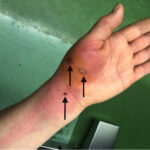It’s a question many concerned cat owners are asking: “Can My Cat Get Covid From Me?” The short answer is yes, cats can contract the virus that causes COVID-19 from humans. While this might sound alarming, it’s important to understand that, much like in humans, infections in pets, including cats, are generally mild and most recover fully. Severe illness in cats due to COVID-19 is exceedingly rare.
If your feline companion does become infected, they may or may not show any signs of being unwell. For those that do exhibit symptoms, the illness is typically mild and manageable at home with supportive care. Being aware of the potential signs of COVID-19 in cats is crucial for responsible pet ownership.
What are the symptoms to watch out for if you suspect your cat has contracted COVID-19? Similar to humans, cats with the virus might display a range of symptoms, including:
- Fever
- Coughing or sneezing
- Labored breathing or rapid, shallow breaths
- Lethargy or unusual tiredness
- Nasal discharge
- Discharge from the eyes
- Vomiting
- Diarrhea
If your cat is showing any of these signs and you suspect a possible COVID-19 infection, it’s important to reach out to your veterinarian for guidance. They can provide advice on the best course of action for your pet’s specific situation.
Should your cat become ill and you yourself are experiencing COVID-19 symptoms or have tested positive, it’s vital that you do not take your cat directly to the veterinary clinic. Instead, contact your veterinarian by phone first and inform them of your COVID-19 status. Many veterinary practices now offer telemedicine consultations, allowing you to discuss your cat’s condition remotely and determine the most appropriate treatment plan without risking further spread of the virus.
What Happens If My Cat Tests Positive for COVID-19?
Depending on the severity of your cat’s symptoms, your veterinarian might recommend home isolation. This is similar to the guidelines for humans who test positive for COVID-19 and have mild symptoms.
If home isolation is advised and you are capable of providing care for your cat at home, it’s essential to keep your cat indoors and restrict contact with other animals and people outside your household. When caring for your sick cat, protect yourself by adhering to the same safety measures recommended for people caring for an infected individual at home, such as wearing a mask and practicing good hand hygiene.
It is particularly important to keep cats that have tested positive indoors and prevent them from roaming freely outside, as this can minimize potential spread to other animals.
Monitoring Your Cat’s Condition During Isolation
Closely monitoring your cat’s symptoms is crucial during home isolation. If you observe any new symptoms emerging or a worsening of their current condition, promptly contact your veterinarian.
Always follow your veterinarian’s specific care instructions. They may advise you to keep a written record of your cat’s symptoms to track their progress and identify any changes quickly.
When Can Home Isolation End for My Cat?
Follow your veterinarian’s professional advice on when it is safe for your cat to resume normal interactions with people and other animals. Generally, your cat can return to its regular routine when it meets the following criteria:
- Your cat has shown no symptoms of illness for at least 72 hours (three full days) without the aid of any medications to manage symptoms;
AND:
- At least 14 days have passed since your cat’s initial positive COVID-19 test;
OR
- All subsequent follow-up tests for active COVID-19 infection are negative, as determined by your veterinarian.
By understanding the risks of human-to-cat COVID-19 transmission, recognizing potential symptoms, and following veterinary guidance, you can ensure the health and well-being of your feline companion during these times.


